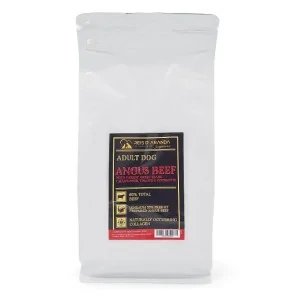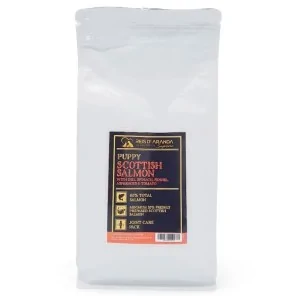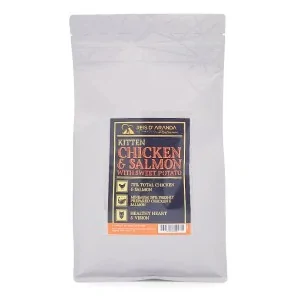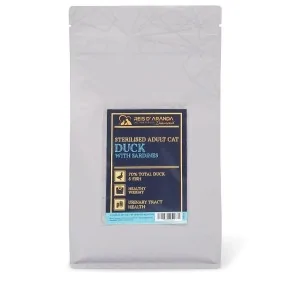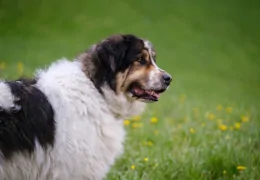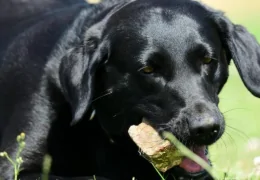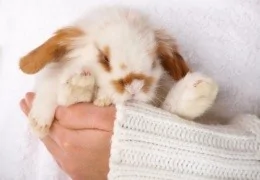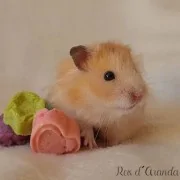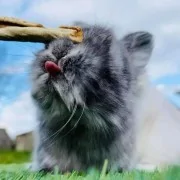The Tornjak originated from genetically homogeneous, almost extinct, indigenous shepherd dogs. These dogs have...
CAN I MAKE MY DOG OR CAT VEGAN?
INTRODUCTION
Vegetarian and vegan diets are becoming increasingly popular and are gaining thousands of followers around the world. Whether for ethical reasons about the impact of the meat industry on the environment or for health reasons. As a result, many people are faced with a moral dilemma when it comes to feeding their pets and are looking for alternatives such as vegan dog or cat food.
But can a dog be vegan because I say so? Or can a cat be vegetarian without a medical reason? The answer is a resounding NO. If you want to know more about the reasons and consequences for dogs, we will summarise them for you in this article.
THE NATURE OF DOGS AND CATS
The dog is a facultative or adaptive carnivore. What does this mean? The dog needs animal protein in its basic diet, but it can subsist on vegetables for a specific period of time (for example in times of famine or during the winter, a behaviour that Felix Rodríguez de la Fuente also reflected in his studies on wolves); moreover, its system is capable of taking advantage of certain nutrients from fruit and vegetables and using them appropriately.
What characterises the canid as a facultative or adaptive carnivore?
DENTURE: Canine teeth are designed to cut and tear pieces of meat. All carnivores have the butcher's tooth, a tooth designed to cut through bone and meat.
SALIVA: Dogs have very little salivary amylase, an enzyme that helps digest carbohydrates. Their body gets its energy from fats as a primary energy source.
THE BITE: If you get the chance, look at the way your dog eats. You will see that they chew vertically, because the jaw opening is scissors, pincer... and they chew very little. Dogs are designed to chew just enough to adapt the food to a size that can pass through the oesophagus, but they do not do this to make it easier to digest (as humans do). In fact, the oesophagus of dogs has a good elasticity that ensures the correct passage of food into the stomach.
THE DIGESTIVE APPARATUS: Their stomach cavity is large enough to ingest large quantities of food. This is due to the lack of availability of food that they may have had in nature and increasing their intake allowed them to subsist. On the other hand, the pH of their stomach is more acidic than that of humans, capable of destroying bones and carrion bacteria. So say goodbye to the fear of raw meat and bones. Important: dogs that are fed on feed have a less acidic pH due to the recurrent consumption of carbohydrates and it removes some protection against bacteria.
As far as the intestines are concerned, dogs have short intestines because they metabolise proteins and fats faster than other nutrients. It also protects them from any bacteria that has not already been eliminated in the stomach. To give you an idea, a dog's transit time is from 12h to 30h; on the other hand, a person's transit time is from 30h to 4 days.
YOUR MORAL CHOICE CANNOT BE AN OBLIGATION FOR OTHERS.
Dogs and cats could never be vegan because they cannot subsist without meat and animal fats (and, in the case of cats, without taurine, an amino acid found especially in the central nervous system, skeletal muscles, heart and eyes).
Today, veganism has become almost a religion and it is easy to find dog and cat owners boasting on social media that their pets are vegan (some add "by their animals' own choice") only to be ridiculed when these same "vegan" dogs or cats prefer meat to a plate of broccoli. It is fine to be vegan, it is a personal decision just as it is to be vegetarian, omnivorous or raw (among many other options), but you cannot impose on others this choice that is yours alone and, even less, if that living being that you are forcing to adapt and share your way of seeing life is a creature that depends on you giving it a good diet (a CORRECT diet) to survive and be healthy.
If you are vegan and do not wish to have contact with animal products, buy them or have to slaughter them "yourself" (as would be the case with snakes whose prey must be alive) it is better to opt for a pet whose diet is based on herbs and plants, such as a rabbit or guinea pig.
THE CONSEQUENCES OF VEGANISM IN DOGS AND CATS
We know that dogs are descended from the wolf and are facultative carnivores, which means that they eat mainly meat, although they can survive by consuming only vegetable matter, but SURVIVING is not correct, as SURVIVING eventually turns into MALVIVING.
Imposing a vegan diet on our dog or cat (unnecessarily, something we will talk about later) can generate a significant nutritional imbalance (vitamins, minerals and proteins), there may be studies that say there are short-term benefits but, in the long term? In the long term we find malnourished or sick animals due to lack of nutrients (or "overdose" of any of these).
Cats should NEVER be fed a vegan diet except in extremely rare cases of food intolerances or allergies to meat proteins (and we would be talking about animals that are chronically ill and must have a very strict nutritional and veterinary follow-up). A vegan diet would leave the cat deficient in vitamin A, taurine (as mentioned above) and arachidonic acid, which is an essential fat for cats and is only found in animal fats.
Trying to balance the nutritional needs, vitamins, minerals, taurine and so on with a vegan diet is an almost impossible task as many of these are found in mammalian tissues. While it is true that dogs can get some of these nutrients from vegetables, this is not 100% and in the case of cats, they get none at all. The reason for this is that the biological value of the protein is given by its essential amino acid content and its digestibility.
MEAT PROTEIN ALLERGIES: AN EXCEPTION
A dog's diet should have between 18-32% good quality protein, carbohydrates are between 30-60% and, to be balanced, should not produce any type of rejection or intolerance in our pets and meet the nutritional requirements for such a pet.
More vegetables than meat can be added when the dog suffers from a serious pathology such as: canine liver cirrhosis, liver poisoning and certain types of stones. In this way, the benefits of a balanced vegetarian diet can be obtained and only temporarily depending on the evolution of the pathology.
Cats are also carnivores by nature, although their ideal diet is not the same as that of dogs. In the case of felines, the ideal proportion is 30-35% protein and carbohydrates are between 30-35%.
But we may find that our dog or cat is allergic to meat proteins (the most common is chicken) and our food options are reduced to a few, such as venison, rabbit (very digestible), duck or fish. In more rare and "exceptional" cases we can find an animal that is allergic to all meat proteins, that is to say: due to a food hypersensitivity it must be vegetarian or vegan (which would be an exception), in this case it will be the vet and an expert in nutrition who will dictate what type of food, quantities and daily menus we should give our pet, as well as the food supplements that we should add to it and give them religiously.
We will never design a menu for our dog or cat without having the appropriate knowledge, even more so if they have any allergies and we do not know what they are allergic to (there are very complete tests on the market that even extend to chemicals and minerals, a little more expensive but totally worth it).
CONCLUSION
In conclusion, it is not advisable for the health of our dogs and cats to apply a vegan diet, as we expose them to an important nutritional deficiency.
The health of our pets is fundamental and it is our responsibility to look after them. Even more so in times of pandemic. If you do not get your pets' usual food, you can look for suitable alternatives, always supervised by your veterinary doctor.
Leave a comment
Log in to post comments

